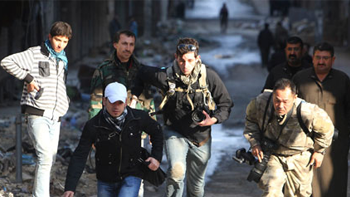Front-line reports and analytical essays by CPJ experts cover an array of topics of critical importance to journalists. Governments store transactional data and the content of journalists’ communications. Media and money engage in a tug of war, with media owners reluctant to draw China’s disfavor and advertisers able to wield surprising clout. In Syria, journalists are determined to distribute the news amid the chaos of conflict. In Vietnam, the government makes a heavy-handed bid to bring the Internet under control. And globally, eliminating witnesses has become an all too easy method of stymying justice when journalists are assassinated.
Middle East & North Africa

Country reports in this chapter were researched and written by CPJ Middle East and North Africa Program Coordinator Sherif Mansour, CPJ Middle East and North Africa Research Associate Jason Stern, and Shaimaa Abu Elkhir, CPJ’s Cairo representative.